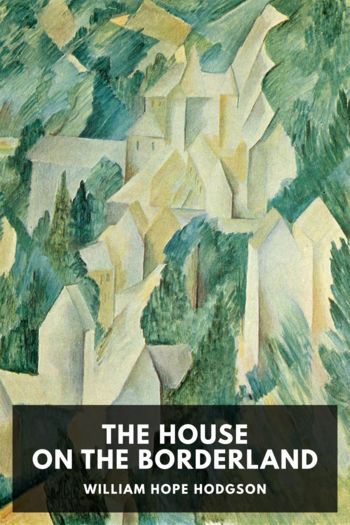The House on the Borderland by William Hope Hodgson (distant reading TXT) 📕

- Author: William Hope Hodgson
Book online «The House on the Borderland by William Hope Hodgson (distant reading TXT) 📕». Author William Hope Hodgson
It struck me, as a peculiar thing, that the sun should cool in evenly defined rings; until I remembered that, possibly, they were but isolated patches, to which the enormous rotatory speed of the sun had imparted a beltlike appearance. The sun, itself, was very much greater than the sun I had known in the old-world days; and, from this, I argued that it was considerably nearer.
At nights, the moon6 still showed; but small and remote; and the light she reflected was so dull and weak that she seemed little more than the small, dim ghost of the olden moon, that I had known.
Gradually, the days and nights lengthened out, until they equaled a space somewhat less than one of the old Earth hours; the sun rising and setting like a great, ruddy bronze disk, crossed with ink-black bars. About this time, I found myself able once more to see the gardens with clearness. For the world had now grown very still, and changeless. Yet, I am not correct in saying “gardens”; for there were no gardens—nothing that I knew or recognized. In place thereof, I looked out upon a vast plain, stretching away into distance. A little to my left, there was a low range of hills. Everywhere, there was a uniform, white covering of snow, in places rising into hummocks and ridges.
It was only now that I recognized how really great had been the snowfall. In places it was vastly deep, as was witnessed by a great, upleaping, wave-shaped hill, away to my right; though it is not impossible, that this was due, in part, to some rise in the surface of the ground. Strangely enough, the range of low hills to my left—already mentioned—was not entirely covered with the universal snow; instead, I could see their bare, dark sides showing in several places. And everywhere and always there reigned an incredible death-silence and desolation. The immutable, awful quiet of a dying world.
All this time, the days and nights were lengthening, perceptibly. Already, each day occupied, maybe, some two hours from dawn to dusk. At night, I had been surprised to find that there were very few stars overhead, and these small, though of an extraordinary brightness; which I attributed to the peculiar, but clear, blackness of the nighttime.
Away to the north, I could discern a nebulous sort of mistiness; not unlike, in appearance, a small portion of the Milky Way. It might have been an extremely remote star-cluster; or—the thought came to me suddenly—perhaps it was the sidereal universe that I had known, and now left far behind, forever—a small, dimly glowing mist of stars, far in the depths of space.
Still, the days and nights lengthened, slowly. Each time, the sun rose duller than it had set. And the dark belts increased in breadth.
About this time, there happened a fresh thing. The sun, earth, and sky were suddenly darkened, and, apparently, blotted out for a brief space. I had a sense, a certain awareness (I could learn little by sight), that the Earth was enduring a very great fall of snow. Then, in an instant, the veil that had obscured everything, vanished, and I looked out, once more. A marvelous sight met my gaze. The hollow in which this house, with its gardens, stands, was brimmed with snow.7 It lipped over the sill of my window. Everywhere, it lay, a great level stretch of white, which caught and reflected, gloomily, the somber coppery glows of the dying sun. The world had become a shadowless plain, from horizon to horizon.
I glanced up at the sun. It shone with an extraordinary, dull clearness. I saw it, now, as one who, until then, had seen it, only through a partially obscuring medium. All about it, the sky had become black, with a clear, deep blackness, frightful in its nearness, and its unmeasured deep, and its utter unfriendliness. For a great time, I looked into it, newly, and shaken and fearful. It was so near. Had I been a child, I might have expressed some of my sensation and distress, by saying that the sky had lost its roof.
Later, I turned, and peered about me, into the room. Everywhere, it was covered with a thin shroud of the all-pervading white. I could see it but dimly, by reason of the somber light that now lit the world. It appeared to cling to the ruined walls; and the thick, soft dust of the years, that covered the floor knee-deep, was nowhere visible. The snow must have blown in through the open framework of the windows. Yet, in no place had it drifted; but lay everywhere about the great, old room, smooth and level. Moreover, there had been no wind these many thousand years. But there was the snow,8 as I have told.
And all the Earth was silent. And there was a cold, such as no living man can ever have known.
The Earth was now illuminated, by day, with a most doleful light, beyond my power to describe. It seemed as though I looked at the great plain, through the medium of a bronze-tinted sea.
It was evident that the Earth’s rotatory movement was departing, steadily.
The end came, all at once. The night had been the longest yet; and when the dying sun showed, at last, above the world’s edge, I had grown so wearied of the dark, that





Comments (0)